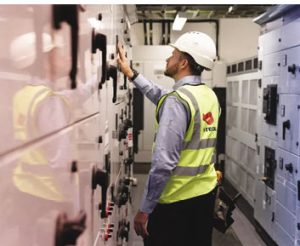 David Whiteley, Head of Sales and Solutions at Integral believes that in a changed world the prime remit of the facilities management sector will be in delivering confidence in the post-COVID workplace
David Whiteley, Head of Sales and Solutions at Integral believes that in a changed world the prime remit of the facilities management sector will be in delivering confidence in the post-COVID workplace
A new frontier of work awaits and 2022 will be a pivotal year for the FM profession. Whilst the UK government has now set out its plans for ‘living with COVID’, including changes to the rules around testing and self-isolating, businesses meanwhile have been developing their own post-COVID property and workplace strategies, and they will need facilities managers to help guide them through this challenging period.
First and foremost, FM teams will play a crucial role in helping rebuild confidence in workplaces by showing employees that they are both safe and able to support their changing needs in an increasingly hybrid work environment. Last year, a JLL global survey of more than 3,300 office workers(i) found that 63 per cent of the workforce want to keep the possibility to alternate between different places of work in the future, with the majority wanting a mix – three days a week in the office and two days a week working remotely on average.
MANAGING THE CHANGING WORKPLACE
The new dynamics of hybrid work, including far greater fluctuance in building occupancy rates, will significantly impact the infrastructure, systems, and services that facilities managers oversee. They will also give FM professionals a critical role in an increasingly competitive talent attraction and retention landscape.
Recently, media reports sparked fears of a ‘Great Resignation’ sweeping the world. One survey by recruitment firm Randstad UK(ii) found almost a quarter of employees planning to find a new job within six months, while the Office for National Statistics(iii) revealed that nearly a million UK workers switched jobs between July and September 2021.
Many commentators claim the factors driving these numbers are unsurprising: stress caused by the pandemic, the shift to remote working, and the impact on work-life balance. And there’s certainly evidence to back these conclusions. According to the JLL research, 36 per cent of global workers, spanning all industries, lack energy while working and struggle to remain motivated and engaged in their job — heaping the pressure on facilities managers to devise a hybrid work strategy that meets their employees’ changing needs and manages the transition to new ways of working effectively.
 Growing appetite for speed, flexibility and agility is also driving the need for more ‘on-demand’ services and the technology to support new working patterns, providing FM with an opportunity to transform core services such as M&E. As an example, cutting-edge smart engineering practices can leverage real-time asset data to give facilities managers a better understanding of how building services can be more effectively controlled in a hybrid work environment.
Growing appetite for speed, flexibility and agility is also driving the need for more ‘on-demand’ services and the technology to support new working patterns, providing FM with an opportunity to transform core services such as M&E. As an example, cutting-edge smart engineering practices can leverage real-time asset data to give facilities managers a better understanding of how building services can be more effectively controlled in a hybrid work environment.
STARTING YOUR SUSTAINABILITY JOURNEY
Another top priority for companies in 2022 is sustainability. COP26 showed that businesses are now outpacing policymakers on net zero commitments by setting targets for 2050 or sooner in response to growing demand from customers, investors, employees, and communities.
The built environment contributes around 40 per cent of global carbon emissions, providing facilities managers with another opportunity to drive change and lead any decarbonisation efforts. The net zero journey is long, but every initiative must begin with a thorough understanding of a building’s carbon output and its assets’ performance. Again, smart engineering can track energy consumption data from equipment, lighting, and energy meters within a single system, giving businesses a clear sustainability baseline for active process improvement as well as future strategic asset management.
Of course, there’s more to sustainability than decarbonising buildings. The pandemic has highlighted the urgent need to create regenerative workplaces(iv) that support mental, social, and physical health. As evidence, employee demand for better indoor air quality at work has grown exponentially since the beginning of the pandemic, while groups such as the British Council for Offices and the Royal Academy of Engineering have called for better ventilation in the UK’s building stock.
Better indoor air quality would not only stop viruses from spreading but would also help employees feel more productive, energised, and engaged at work. From the facilities manager’s point of view, this creates the potential to make a difference through installing smart environmental controls that can adjust factors such as lighting, heating or humidity in real time, especially useful for any businesses attempting to implement a hybrid working model.
Facilities management has the skills and tools to establish itself as an organisational leader in 2022. Whether the switch to hybrid working, the net zero journey or employee wellbeing, FM can become the change agent that businesses need in the new world of work.





